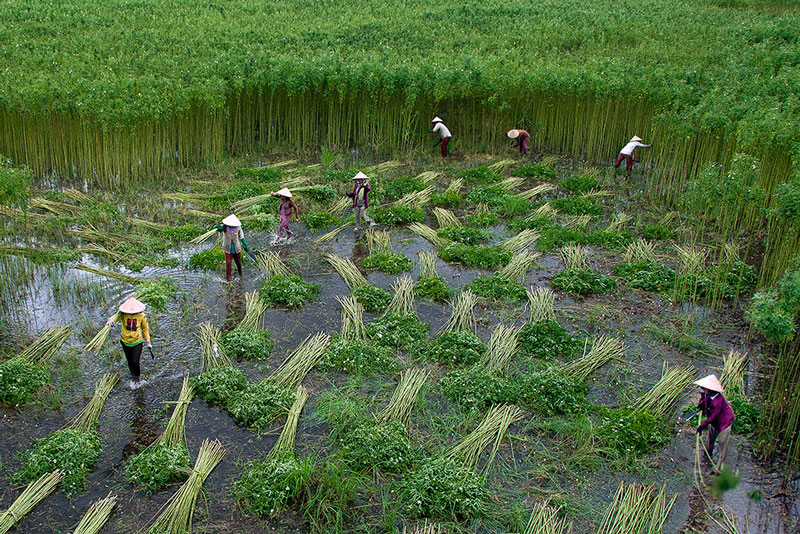Vietnam is one of the fastest growing economies in Asia, with the Asian Development Bank forecasting 6.5% growth in 2018, matching decades of strong growth. A critical part of this economic success story is the Mekong Delta, home to 18 million people. While the delta comprises only 11% of Vietnam’s area, it contributes more than one fifth of gross domestic product (GDP).

It produces more than 50% of Vietnam’s rice (with 90% of Vietnam rice export from the Delta), more than 65% of seafood production (including aquaculture and capture fisheries), and 70% of fruit production, all of which represent fast-growing export sectors. The Mekong Delta is also a hotspot for freshwater and coastal biodiversity, with more than 300 species of fish alone, making the delta both an economic and biodiversity conservation priority nationally and globally.
The natural productivity of the Mekong Delta, however, is under considerable threat from development related risks. Construction of hydropower and irrigation projects on the mainstream of the Mekong River in China, Laos, Thailand and Cambodia and large scale sand extraction are drastically reducing the amount of sediment reaching the delta. This is causing the delta to both shrink and sink, further exacerbated by overexploitation of groundwater and loss of coastal mangroves within the delta itself. Furthermore, this causes increasing river bank and coastal erosion, more exposure and vulnerability to floods and typhoon, increased saltwater intrusions that reduce the productivity of sectors like agriculture and fisheries, and also changes the composition, structure and function of wetlands ecosystems, which are important for community livelihoods and economic development.
Climate change is exacerbating all of the above issues. Vietnam is considered one of the top ten countries most negatively impacted by climate change, and the Mekong Delta is one of the three most vulnerable deltas on Earth. Rising sea levels, increasing aggression of sea forcing agents (wind, waves, long shore currents), more frequent tropical storms, shifting rainfall patterns and higher temperatures are all further increasing water stress and exposure to natural disasters, with further aggravating impacts to people and nature and creation of more climate migrants.
Within this context of high economic and biodiversity importance, and climate and development related risks, WWF identified the Mekong Delta as a priority landscape for Vietnam, and has been actively working here since 2007. WWF aims to restore the natural resilience of the Mekong delta, highlight risky investments, ensure climate resilience of local populations and support the delta’s biodiversity values.
WWF will realise this through three main approaches, conducted in partnership with the public and private sectors as well as Civil Society Organisations and development partners.
Improve regulation and management of sediment
Hydropower projects and sand extraction for concrete and land reclamation to support the region’s construction boom threaten to further break up sediment flows. WWF estimates 50 million tonnes of sand were extracted from the Lower Mekong mainstream in 2011 alone, much more than the river produces in a year. In Vietnam, between 1998 and 2008, the river bed in the Mekong Delta’s two main channels fell more than one metre, allowing salt water to penetrate further upstream into fertile rice paddies and probably reducing ground water recharge. Coastal erosion is also increasing: on average of 12 metres of land is lost along the coast of the delta each year. Though more difficult to measure, the entire delta is also subsiding.
Beyond producing scientific assessments and awareness of the impacts of reduced sediment replenishment to the delta, WWF is promoting solutions on the scale of the problem by, notably, establishing a more accurate basin-wide sediment budget, creating a business case for alternative sourcing for sand, and producing sand efficient building solutions and guidelines toward more sustainable cities.
Promote nature based solutions to avoid and mitigate water & climate risk
The natural coping capacity of deltas needs to be recognised and understood in order to utilise their benefits to humans while avoiding unnecessary exposure to risks and moving from a resistance to a resilience approach. This will be achieved by promoting large-scale cost effective nature-based solutions to restore the natural resilience of deltas and reduce investment risks and the impacts on people and nature. This includes establishing and monitoring water abstraction and quality targets, planning and zoning with good understanding of natural processes like floods, and restoring or constructing new wetlands that provide multiple benefits including water storage, purification, filtration, decontamination, habitat for conservation of endangered species, and ecotourism. Guidance on mangrove restoration in the context of severe coastal erosion will be provided, e.g. seedling site planning needing to take place with an understanding of coastal erosion and deposition processes to ensure high success rate, as well as preparing a portfolio of bankable projects to attract investment into natural infrastructure from public and private sectors, and engaging companies to green supply chains and take collective action to address water risks.
Redirect and de-risk investment and financial flows
WWF works with key financial players (e.g., investors, insurers, lenders, policy makers) to promote a framework for more sustainable investment practices, further driving business change and advocacy for policies and best practices that encourage environmental sustainability, low carbon and resource efficient investments. This is especially important in the Mekong Delta, where the very natural flows of the Mekong that are maintaining the structural integrity of large land masses are at risk and action requires providing coordinated technical expertise on biodiversity, integrated basin management, e-flows, geomorphology, sustainable hydropower, natural capital, water stewardship, and river governance.